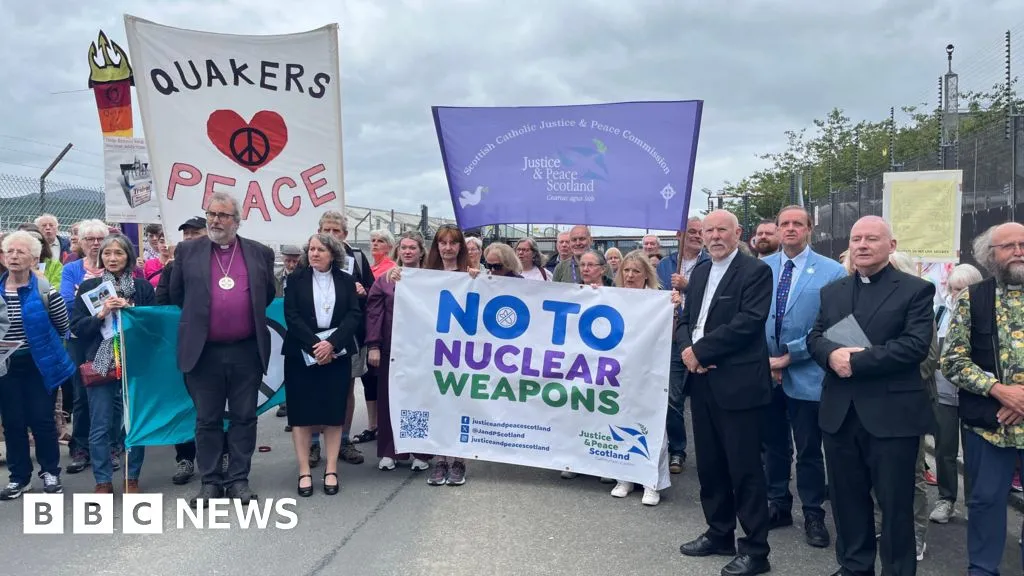More than 100 people have attended a peace vigil outside the Faslane naval base, home to the UK's nuclear-armed submarines.
The event was timed to mark the upcoming 80th anniversary of the atomic bombs being dropped on Japan.
The peace vigil was organised by Scotland's three largest Christian churches, which are calling for an end to all nuclear weapons.
The protest came as President Trump announced he had ordered two nuclear submarines to be deployed "in the appropriate regions" in response to comments by former Russian President Dmitry Medvedev on social media.
The No To Nuclear Weapons event took place at the south gate of Faslane, which is officially called His Majesty's Naval Base (HMNB) Clyde.
It is the home of all the Royal Navy's nuclear submarines, including the Vanguard-class ballistic missile submarines which carry Trident nuclear missiles.
The four Vanguard submarines are the sole platforms for the United Kingdom's nuclear weapons and are due to be replaced by the new Dreadnought-class submarines after 2030.
The vigil was attended by the Most Rev William Nolan, the Catholic Archbishop of Glasgow; Rt Rev Rosie Frew, Moderator of the General Assembly of the Church of Scotland; and the Most Rev Mark Strange, Primus of the Scottish Episcopal Church.
Members of the Quakers, the Iona Community and the United Reform Church also took part.
Speaking ahead of the event, Archbishop William Nolan said: "The phrase 'never again' gained much currency 80 years ago.
"But the actions of nuclear powers, including our own, run contrary to that.
"As the late Pope Benedict articulated, the very concept of a nuclear deterrence has instead fuelled an arms race as those on opposing sides keep seeking to outdo the other.
"We have seen this in the replacement for Trident. Deterrence itself, therefore, has increased insecurity and does nothing to build up trust which is necessary to encourage disarmament and build up peace."
An estimated 140,000 people were killed at Hiroshima and a further 74,000 at Nagasaki when the USA dropped the first and only atom bombs ever used in a conflict, on 6 and 9 August 1945.
The UK began developing a nuclear weapons programme at the end of World War Two and held its first bomb test in 1952.
Throughout the 1950s and 1960s the main platform for the UK's nuclear weapons was the air-based V-bomber fleet, named after the three strategic bombers used to carry the missiles - the Vickers Valiant, Handley Page Victor and Avro Vulcan.
Since 1969, the UK has operated continuous at-sea deterrence, with first Polaris and then Trident missiles stored on and launched from nuclear-powered submarines with the capacity to remain submerged at sea for months.
Faslane, which sits on the Gare Loch - is also the home of Astute-class nuclear powered but conventionally armed attack submarines.
The UK's stock of nuclear warheads is based at the Royal Naval Armaments Depot (RNAD) Coulport on nearby Loch Long.
The Faslane base has long been the focus of anti-war protests from groups such as the Campaign for Nuclear Disarmament (CND) and Trident Ploughshares.
A peace camp has been based just outside the site since 1982.
